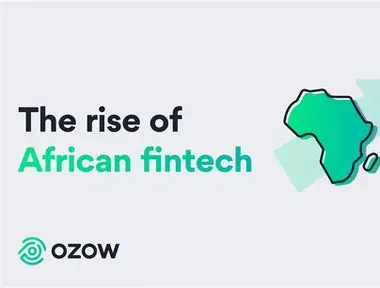The Rise of Fintech in Africa – Breaking Banks and Building the Future
By Rebecca Aboagyewah Oppong | Veebeckz Tech Media | Published on 10th May, 2025
On any given day in Ghana, a woman selling tomatoes at the Agbogbloshie market can receive mobile payments from customers, buy airtime, and pay school fees for her children—all from her phone. A boda-boda rider in Kampala checks his daily earnings through a digital wallet. In Lagos, a tech-savvy university student invests 10 cedis in mutual funds via a fintech app while sipping coffee at a campus café. Across the continent, scenes like these are now commonplace, and they are the product of one of Africa’s most powerful digital revolutions: fintech.
Financial technology, or fintech, refers to the use of digital tools and platforms to deliver financial services—payments, loans, savings, insurance, and investing—more efficiently and inclusively. In Africa, fintech is not just disrupting traditional banks. It is creating access where there was none, offering convenience where there was bureaucracy, and replacing rigid systems with nimble solutions that reflect real human needs.
The rise of fintech in Africa is both a story of innovation and a response to necessity. In Ghana, like much of the continent, large portions of the population have long been excluded from formal financial systems. High banking fees, physical distance from bank branches, lack of documentation, and mistrust of financial institutions have left millions unbanked or underbanked. Mobile phones changed the game.
With mobile penetration now surpassing 80% in most African countries, fintech entrepreneurs recognized an opportunity to turn every phone into a bank. In 2009, MTN Mobile Money (MoMo) launched in Ghana, offering simple transactions through USSD codes. Over the years, it expanded into savings, loans, insurance, and utility payments. Today, over 17 million Ghanaians use MoMo, making it one of the largest and most successful mobile money ecosystems on the continent. For many, MoMo is their first—and only—bank.
But Ghana’s fintech story doesn’t end with mobile money. A new generation of startups is emerging, offering specialized financial products built for African lifestyles. Fido provides microloans to gig workers using AI credit scoring models. ZeedPay enables seamless remittances and salary disbursements, even in remote areas. BezoMoney is digitizing the traditional susu savings model, helping low-income users build credit histories. Bloom, launched in Sudan but expanding into West Africa, offers dollar-denominated savings accounts to hedge against local currency volatility. These innovators aren’t just copying Western apps—they’re solving uniquely African problems with cultural intelligence and scalable technology.
In Nigeria, companies like Flutterwave and Paystack are revolutionizing online payments, making it easier for small businesses to accept digital transactions, both locally and globally. In Kenya, M-Pesa, the original pioneer of mobile money, now processes more payments than all the country’s banks combined. In South Africa, Yoco and TymeBank are giving entrepreneurs low-cost POS and digital banking solutions. Together, these ventures form a fintech movement that is democratizing finance on an unprecedented scale.
The impact is massive. Fintech has enabled more Africans to save securely, pay transparently, and access capital for the first time. It is unlocking entrepreneurship, especially for women and youth who historically lacked collateral or formal income documentation. In Ghana’s northern regions, farmers are using fintech apps to receive crop payments, access insurance, and get real-time market prices. In refugee settlements in Uganda and Kenya, humanitarian agencies are leveraging fintech wallets to distribute aid in dignified and efficient ways.
Yet, the rise of fintech also brings new questions and risks. As financial services become digital, data becomes the new currency—and data privacy becomes paramount. Many fintech users operate without fully understanding how their personal data is stored, shared, or monetized. Regulation is still playing catch-up. While Ghana’s Bank of Ghana has taken steps to license and supervise fintechs through its Payment Systems and Services Act (2019), enforcement, consumer education, and data protection remain areas that need strengthening.
There’s also the challenge of digital fraud. As fintech adoption increases, so do scams, phishing schemes, and identity theft. Unsuspecting users can fall victim to fake apps or social engineering, losing hard-earned money. Cybersecurity frameworks, user education campaigns, and shared fraud databases are urgently needed to build long-term trust in the ecosystem.
Moreover, fintech solutions must be inclusive by design. Too many apps still assume users are English-literate, smartphone-equipped, and digitally savvy. But in rural areas, women and the elderly are more likely to rely on feature phones and oral communication. Truly transformative fintech must support local languages, USSD interfaces, voice instructions, and accessible onboarding processes.
The investment community, however, remains bullish. In 2022 alone, African fintechs raised over $1.5 billion in venture funding—more than any other sector on the continent. International giants like Stripe, Visa, and Mastercard are partnering with or acquiring African fintech firms to tap into the continent’s youthful, mobile-first market. But this influx of capital raises questions about control, data sovereignty, and the long-term vision of African financial independence.
To ensure that fintech truly serves Africa’s development, we need to move from fast growth to deep impact. Governments must balance innovation with consumer protection. Developers must design for inclusion, not just scale. Investors must prioritize long-term ecosystem health over short-term exits. And citizens must be empowered—not just to use fintech, but to understand it, question it, and co-create its future.
Fintech is more than a trend—it is infrastructure. It is rewriting the script of what it means to bank, to transact, to trust, and to belong in a financial system. In Ghana, fintech is not about breaking banks—it’s about building futures.
“Fintech is not disrupting finance in Africa—it is creating it.”
